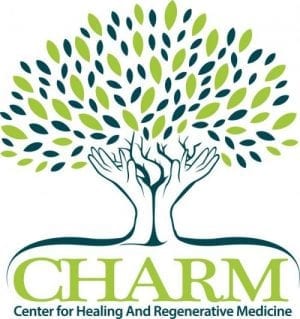Non-Surgical Shoulder Pain Treatment
If shoulder pain is limiting your daily activities—reaching for items on high shelves, throwing a ball with your kids, or getting comfortable sleep—you’re not alone. The Center for Healing and Regenerative Medicine (CHARM) in Austin understands how frustrating shoulder pain can be and strives to deliver lasting solutions to get you back to the life you love.
Our innovative regenerative medicine approaches help your body heal from within, addressing the root cause of your pain rather than simply masking symptoms.
What is Regenerative Medicine?
Regenerative medicine represents a fundamental shift in how we approach healing. Instead of relying solely on medications or rushing into surgery, regenerative therapies work with your body’s natural healing mechanisms to repair damaged tissue and restore function.
These advanced treatments use your body’s own healing factors—concentrated platelets, growth factors, and stem cells—to jump-start the repair process in injured shoulder tissues. The goal is to help your shoulder heal so you can return to an active, pain-free life.
Common Shoulder Conditions Treated
Your shoulder is your body’s most mobile joint, which makes it vulnerable to injury and wear. Our regenerative medicine specialists have extensive experience treating a wide range of shoulder conditions that can benefit from these innovative therapies.
Rotator Cuff Injuries
The rotator cuff stabilizes your shoulder and enables lifting movements. Regenerative treatments can help repair partial tears and strengthen weakened tendons, potentially helping you avoid surgery while restoring strength and mobility.
Shoulder Tendonitis
When shoulder tendons become inflamed from overuse or injury, simple movements become excruciating. Our regenerative therapies target underlying tissue damage, promoting healing that addresses the source rather than just reducing symptoms temporarily.
Labral Tears
The labrum helps stabilize your shoulder joint. Regenerative medicine can stimulate the repair of labral tissue and improve joint stability, often allowing patients to return to sports and activities they love.
Shoulder Arthritis
Traditional treatments focus on managing arthritis symptoms, but our regenerative approaches work to slow cartilage breakdown and promote healthy tissue growth, potentially delaying or eliminating the need for joint replacement.
Degenerative Joint Disease
Age-related shoulder breakdown doesn’t mean accepting chronic pain. Regenerative medicine can slow the degenerative process and stimulate your body’s repair mechanisms, helping maintain function and comfort.
Benefits of Regenerative Medicine for Shoulder Pain
Choosing regenerative medicine for your shoulder pain offers distinct advantages over traditional treatment approaches. These benefits reflect our commitment to helping you heal in a way that fits your life and long-term wellness goals.
- Long-term improvement: Lasting tissue repair rather than temporary symptom relief
- Minimal downtime: Most procedures are performed in-office with little recovery time
- Natural healing process: Uses your body’s own healing factors
- Non-surgical option: Many patients avoid invasive surgery and extended recovery
- Reduced medication dependence: Less need for pain medications as healing progresses
Regenerative Treatment Options for the Shoulder
Platelet- Rich Plasma (PRP) Therapy
PRP harnesses healing factors from your own blood. We concentrate your platelets, which contain growth factors that signal tissue repair.- Stimulates natural healing in damaged shoulder tissues
- Promotes the formation of new, healthy tissue
- Precisely delivered using image guidance
Stem Cell Therapy
We use bone marrow concentrate containing your own stem cells and growth factors to provide building blocks for tissue regeneration.- Combined with precise injection techniques
- Harvested safely from your own body
- Helps repair cartilage, tendons, and ligaments
Prolotherapy
Prolotherapy involves injecting a solution that creates a controlled, mild inflammatory response in damaged tissues, stimulating your body’s natural healing cascade.- Helps stabilize shoulder joints
- Particularly effective for chronic, persistent pain
- Strengthens weakened ligaments and tendons
What Sets CHARM Apart from Other Pain Management Specialists
At CHARM, we treat you as a whole person, not just your shoulder. Our multidisciplinary team includes fellowship-trained physicians in both interventional pain and regenerative medicine, manual therapists, and movement specialists who collaborate on your personalized treatment plan.
We use precision diagnostics and image-guided injections for safety and accuracy. Most importantly, your care continues beyond pain improvement—we guide your recovery through 1:1 hands-on therapy, movement retraining, and nervous system support to help you stay active and avoid reinjury.
Request an Appointment at Our Pain Management Clinic
You don’t have to live with shoulder pain. At CHARM, we’re ready to help you explore regenerative medicine options that could transform your healing journey. Contact our Austin clinic today to schedule a comprehensive evaluation and develop a treatment plan designed specifically for your needs and path to healing.
Commonly Treated Conditions at CHARM

Neck & Back PaiN
Facet Arthritis
Herniated Disc
Radiculopathy
Post Laminectomy Syndrome
Sacroiliac Joint Pain
Osteoarthritis
Labral Tears
Bursitis
TendinitiS
Tendinopathy
Tennis & Golfers Elbow
Ligament Tears
Carpal Tunnel
ArthritiS
Instability
Rotator Cuff Tears
Labral Tears
Osteoarthritis
Instability
Osteoarthritis
Ligament Tear
Meniscus Tear
Post Surgical Pain
Instability
Osteoarthritis
Tendinopathy
Ankle Instability
Plantar Fasciitis
Bunion-Toe Pain
